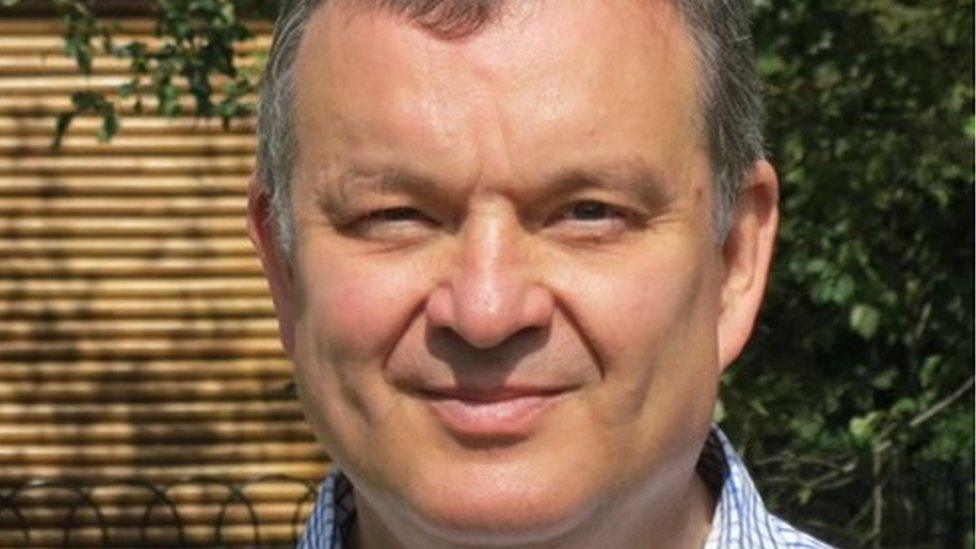Weapons expert cut from government event due to Twitter posts
- Published

Dan Kaszeta will no longer be speaking at tomorrow's Chemical Weapons Demilitarisation Conference, despite being invited to do so four months ago
A global expert on nerve agents, stood down from speaking at a government-backed conference, says he believes it is because he is outspoken on a range of issues including asylum policy.
Dan Kaszeta was disinvited from Tuesday's conference after his social media content was vetted.
The Ministry of Defence said checks on people speaking at government-organised events ensured a balanced discussion.
But Mr Kaszeta insisted he would have only spoken on his area of expertise.
That is firmly in the area of chemical, biological and radiological weapons and warfare - a subject in which he has gathered three decades of experience. He also spent 12 years working as an adviser for the White House.
So when the Ministry of Defence was putting together the guest list for the 25th annual Chemical Weapons Demilitarisation Conference - which in its own words would "bring together international experts and promoting collaboration to achieve a future free from chemical weapons" - Mr Kaszeta's services as a keynote speaker were secured back in January.
The American, who has been based in the UK for the past 13 years, told BBC Two's Newsnight he was "outraged" that the government's trawl through his Twitter account - on which he poked fun at Liz Truss, expressed anti-Brexit views and criticised asylum policy - means he can no longer share his knowledge with delegates from the government, industry, academia and armed forces.
He received an email last month - which has been shown to Newsnight - that told him: "Rules introduced by the Cabinet Office in 2022 specify that the social media accounts of potential speakers must be vetted before final acceptance to the programme. The vetting is impartial and purely evidence-based.
"The check on your social media has identified material that criticises government officials and policy. It is for this reason and not because we do not value your technical insight, that I'm afraid that we have no choice and must cancel your invitation to the CWD conference."
Mr Kaszeta stressed he was never going to speak about policy matters at the event.
"This is an outrage against free speech. I was going to speak about possible future scenarios around the world in which chemical demilitarisation would be relevant. I think perhaps the most controversial thing I would say was perhaps, gee, we don't really know what's going on in North Korea," he said.
'No-platform policy'
The email is the clearest indication so far of the unpublished guidance from the Cabinet Office on the restrictions on who can be given a prominent platform to speak at government venues and events.
It was first introduced after political blogger Guido Fawkes highlighted the views of an academic , externalwho was due to speak to civil servants at the Home Office during Black History Month in 2021.
A year later, the first known example of the new "no-platform" rule being used came when Kate Devlin, a professor at King's College London, an expert on artificial intelligence, was disinvited from speaking at an event about women in tech.
She told the Independent at the time , externalthat she had received an email saying it was because she had "made a criticism of government policy on social media".
In her case, she had previously criticised the government's planned Online Harms Bill, made anti-monarchy comments and retweeted a parody of Liz Truss.
Interviewed at the time, she told Newsnight she had been very clear that her talk would not be touching on any areas she had her own private views on and she found it "quite alarming" that she had still been excluded.
Mr Kaszeta argued that being a critic of some government policies should not prevent him taking part in an event on a completely unrelated subject.
"I'm a critic of the government's policy on homelessness and asylum seekers. Why that should have any impact whatsoever on whether or not I can speak to a technical conference in my own area of expertise. That's Stalinist."
When approached by Newsnight for an explanation, the government said: "As the public would expect, we conduct due diligence checks and carefully consider all speakers at any government hosted conference to ensure that we can have a balanced and constructive discussion around our policies."
Other than Ms Devlin and Mr Kaszeta, whose identity was first revealed by the Times,, external Newsnight knows of three other professionals who have received similar letters after the Cabinet Office vetted their social media.